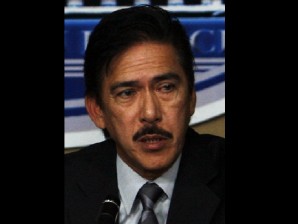MANILA, Philippines – Senators have been advised to follow the rules of the Senate and refrain from issuing “unnecessary” statements that would only provoke controversies when they ask questions to Chief Justice Renato Corona.
Corona is set to appear and testify for the first time before the Senate acting as an impeachment court
“All the rules of the Senate are in place, all you have to do is just to follow the rules,” Senate Majority Leader Vicente “Tito” Sotto III told reporters on Monday.
Sotto declined to say what they tackled in the caucus of senators held in the chamber during lunch time but said they were advised by Senate President Juan Ponce-Enrile to follow the rules.
He said Senate President reminded senators that they “should follow the rules of the Senate, avoid unnecessary statements or issues that might just evolve into controversies, or something like that.”
“The Senate President is ready tomorrow (Tuesday) to announce everything at the start of the trial,” Sotto said.
Only the Senate President, Sotto said, was authorized by senators who attended the caucus to announce what they discussed in the meeting.
“I assure you nothing is controversial, believe me, everything is just ministerial,” said the Majority Leader.
Sotto though said the Senate would be stricter with its two-minute rule allowed for each senator to ask questions either to witnesses, or members of the prosecution and defense teams.
“There is a limit of two minutes and stricter in the two-minute rule,” he said.
“No manifestation will be allowed. We will encourage everyone to avoid long predicate, just questions and it is up to the Senate President if he feels that there could an extension,” he further said.
Sotto said they are willing to hold hearings even until 10:00 p.m. so that Corona could finish his testimony in just two days.
“As far as possible, we want this to end because we have many pending legislative work in the Senate,” he said.



